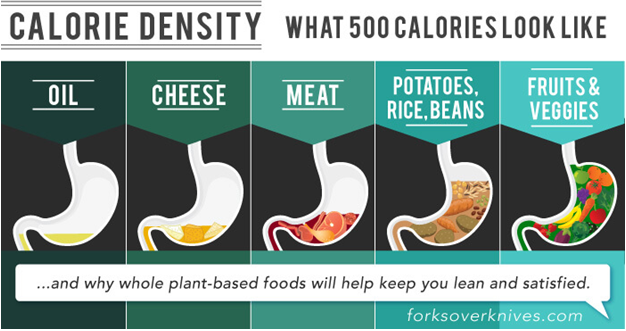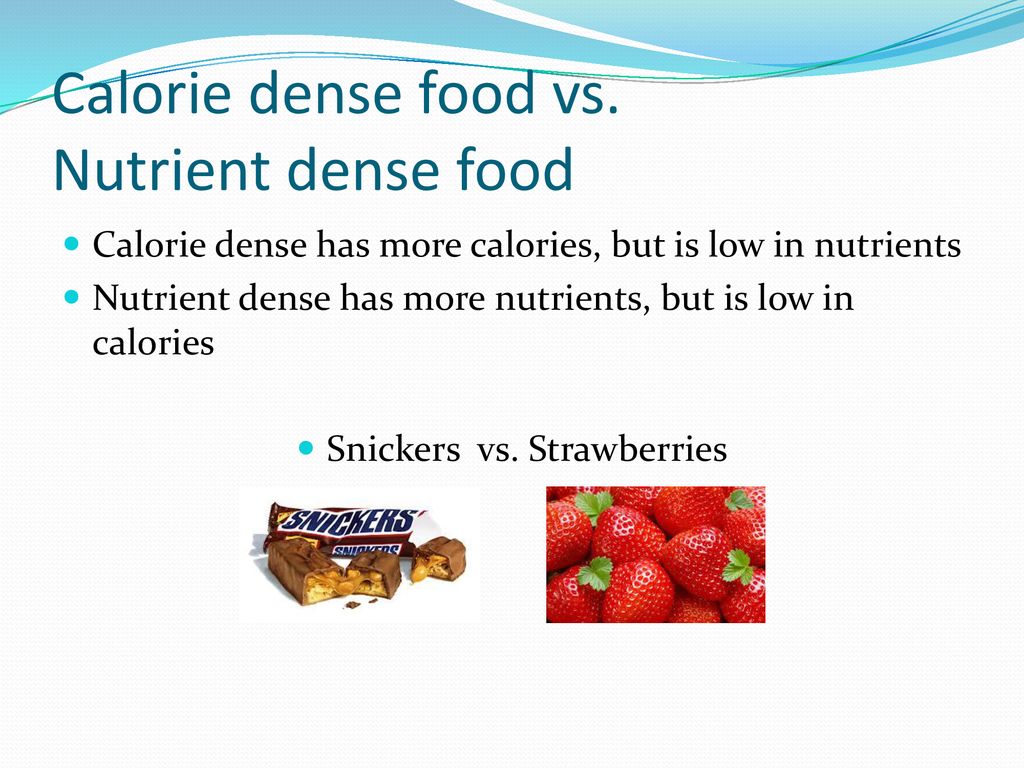Explain the Difference Between Nutrient-dense Foods and Calorie-dense Foods.
However some foods are both nutrient dense and energy dense such as cheese meat and nuts. Explain the difference between nutrient-dense foods and calorie-dense foods.

Calorie Dense Vs Nutrient Dense One On One Fitness
Some foods can be energy dense and provide few nutrients while other foods can be nutrient dense.

. The difference between nutrient-dense and calorie-dense foods is that nutrient-dense foods provides all the nutrients needed by the body whole calorie-dense foods are mainly energy giving. Eating a diet high in nutrient dense foods is associated with many health benefits and it can provide sources for nutrients that are commonly low in a typical Western diet. Compounds in food that the body needs for to grow and function.
Calorie-dense foods are essentially junk foods that are high in calories and high in fat sugars or salts. Give an example of each. They have little nutritional value and are often called empty calories.
Nutrient-dense foods are foods that are very healthy and you can typically eat more of these foods than calorie-dense foods. Nutrient-dense foods are rich in nutrients relative to their calorie content. This strawberry-banana milkshake recipe contains just 200 calories per serving.
They have little nutritional value and are often called empty calories. 10 rows You also have to look at the nutrients that a food contains. Give an example of each.
Calorie density is a measure of the calorie content of food relative to its weight or volume. Nutrient density is most useful as a. Foods that are energy-dense contain a higher number of calories per serving while foods that are nutrient-dense contain a higher level of vitamins minerals and other important nutrients with little or no added sugars or fats that raise calories.
Foods that are very high in fat or sugar are energy dense. These foods provide the most health benefit to your body. Calorie-dense foods are essentially junk foods that are high in calories and high in fat sugars or salts.
They provide fewer calories and are high in Vitamins A C D and E calcium iron potassium zinc fiber and healthy fats. These include various healthy foods such as whole vegetables fruits. The calories may come from protein fat or carbohydrates.
If a food is high in nutrients but low in calories we say it is nutrient dense. Foods that have a lot of nutrients but not a lot of calories. Empty calories are foods and beverages that are very high in calories but provide a very low nutrient value including vitamins and minerals.
Calorie-dense foods are foods which contain large quantities of high calorie food such as fats proteins and carbohydrates. Energy-dense foods tend to be dry and high in fats such as biscuits chips candy butter etc whereas less energy-dense foods are usually rich in water andor fibre such as fruits vegetables vegetable soups etc. What is the difference between nutrient dense foods and calorie dense foods.
Terms in this set 10 nutrient. Foods that are nutrient dense have high levels of nutrients per serving. As in the earlier example.
Nutrient dense refers to the amount of vitamins minerals andor protein in a food. Calories in foods that have little or no nutritional value. It also boasts 7 grams of protein 7 grams of dietary fiber and only 1 gram of fat.
Nutrient density refers to how much nutrition a food provides per calorie. Foods that are energy dense have lots of calories per serving. Nutrient-dense foods are foods or beverages that have only a few calories but provide minerals vitamins and other substances that benefit our body.
Foods such as whole grains fruits nuts etc. Nutrient Dense Foods vs. Nutrient-dense foods include items such as veggie pizza fresh.
They mainly provide energy. Examples of calorie-dense food or junk food include soda cake pepperoni pizza and frosted cereals. Nutrient dense foods provide a high amount of nutrients fiber vitamins minerals and phytochemicals for a relatively low amount of calories.
If a food is calorie dense that usually means it is high in energy and low in nutrients. Nutrient-dense foods are those that contain a low amount of energy or calories for their weight but a high number of healthy nutrients. Calories give energy whereas nutrients give you other things your body needs to survive such as protein iron etc.
Think of the difference between potato chips and plain baked potato or sweetened yogurt and plain yogurt or creamed spinach. The term energy density refers to the amount of energy or calories per weight of a food or drink. Explain the difference between nutrient-dense foods and calorie-dense foods.
It is also called energy density and is usually measured as. Nutrients and have added fat sugar and salt. The difference between nutrient dense Calorie foods and empty Calorie foods lay in the nutritional content Vitamin Minerals contained in the food.
While it does contain 18 grams. Nutrient-dense foods have a lot of nutrients for the amount of energy it provides. Energy density measures the calorie content of foods while nutrient density refers to the nutrient composition of foods.
Foods that are energy dense contain a higher number of calories per serving while foods that are nutrient dense contain a higher level of vitamins minerals and other important nutrients with little or no added sugars or fats that raise calories. Nutrient-dense foods contain a lot of essential nutrients per serving while energy-dense foods are those that have a lot of calories in a serving. Some calorie-dense foods are extremely healthy and some calorie-dense foods like meat is very unhealthy.
But obviously terms like high in nutrients or low in calories are relative. Examples of calorie-dense food or junk food include soda cake pepperoni pizza and frosted cereals. Think of the difference between potato chips and a plain baked potato or sweetened yogurt and plain yogurt or creamed spinach and.
Examples of calorie-dense food or junk food include soda cake pepperoni pizza and frosted cereals. In other words theyre foods that give you more nutrition bang for your buck.

Calorie Dense Vs Nutrient Dense Foods The Way Forward

No comments for "Explain the Difference Between Nutrient-dense Foods and Calorie-dense Foods."
Post a Comment